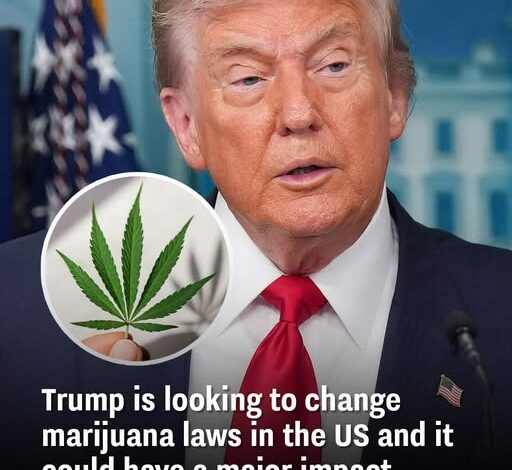A Historic Shift? U.S. Federal Government Considers Reclassification of Cannabis Amid Growing Calls for Reform

In recent years, few policy debates have evolved as quickly and dramatically as the conversation surrounding cannabis in the United States. Once regarded primarily as an illicit substance, cannabis has become a central topic in discussions of healthcare, economics, criminal justice reform, and states’ rights. Now, the possibility of a significant federal policy shift has entered the national stage, with reports that the administration of former President Donald Trump considered reclassifying cannabis under federal law.
While no final decision has been made, the very fact that the U.S. government acknowledged reviewing cannabis policy marks a historic moment. For over 50 years, marijuana has been classified as a Schedule I controlled substance under the Controlled Substances Act of 1970—a category reserved for substances deemed to have a high potential for abuse and no accepted medical use. This classification has shaped everything from criminal penalties to tax regulations, research opportunities, and the broader cultural narrative around cannabis.
If reclassification occurs, it could reshape the American landscape in profound ways: opening opportunities for medical research, changing the way businesses operate, and reducing strain on the criminal justice system. At the same time, the debate raises complex questions about public health, youth safety, and the balance of power between federal and state governments.
Why Cannabis Classification Matters
To understand the gravity of the potential shift, it’s helpful to revisit the current legal framework. Cannabis has been treated as a Schedule I drug for more than half a century. This means that, under federal law, it is considered more dangerous than substances like cocaine (Schedule II) or certain prescription painkillers.
This classification has carried far-reaching consequences:
Medical Research Restrictions: Because of its Schedule I status, researchers have faced significant barriers to studying cannabis. Federal approval processes are lengthy and restrictive, limiting scientific understanding of its potential benefits and risks.
Business Challenges: Cannabis businesses in states where the plant is legal cannot access normal banking services or claim standard business tax deductions, creating financial burdens not shared by other industries.
Criminal Justice Impact: For decades, federal prohibition contributed to high arrest rates, particularly for low-level possession offenses. Communities of color have disproportionately felt these effects, leading to concerns about fairness and equity.
The Cultural and Historical Backdrop
Cannabis prohibition in the U.S. is rooted in more than just medical or safety concerns. Historians note that the original push to criminalize marijuana in the 20th century was influenced by political, cultural, and even racial dynamics. For much of the late 20th century, the “war on drugs” reinforced harsh penalties for marijuana-related offenses, creating lasting social consequences.
Yet, over time, public opinion has dramatically shifted. Whereas cannabis legalization was once a fringe issue, today it enjoys majority support among Americans. According to numerous national polls, more than two-thirds of adults favor some form of legalization, particularly for medical purposes. This change in public sentiment has been a driving force behind state-level reforms.
Trump’s Public Comments on Cannabis Policy
During his presidency, Donald Trump made cautious but notable remarks regarding cannabis policy. When asked whether his administration would consider changing marijuana’s classification, Trump confirmed that the issue was under review.
“We’re looking at it,” he said in response to reporters. “Some people like it, some people don’t. It’s a complicated subject. There are good things said about medical use, and not-so-good things said about other uses. But we’re reviewing it carefully.”
While these comments were measured, they represented one of the clearest acknowledgments from a sitting U.S. president that federal cannabis laws might be reconsidered. His remarks also reflected a distinction between medical and recreational use—a nuance that has become central to the broader policy debate.
Medical Cannabis: A Central Part of the Debate
One of the strongest arguments for reclassification is the growing body of evidence supporting cannabis’s medical applications. Patients and doctors across the country have reported benefits in treating conditions such as:
Chronic pain
Epilepsy and seizure disorders
Post-Traumatic Stress Disorder (PTSD)
Glaucoma
Multiple sclerosis
Research has also suggested potential benefits in managing chemotherapy-induced nausea, improving sleep, and reducing inflammation.
For many advocates, keeping cannabis in Schedule I prevents further exploration of these benefits. Reclassification—even to Schedule II or III—would allow scientists to conduct broader, federally approved studies, providing clearer data on both safety and effectiveness.
Public opinion reflects this distinction. While recreational cannabis still faces some opposition, support for medical marijuana is overwhelming, often surpassing 80% approval in national surveys.
Economic Implications of Federal Reclassification
Beyond health and criminal justice concerns, the potential reclassification of cannabis carries enormous economic significance.
The legal cannabis industry has become one of the fastest-growing sectors in the United States. As of recent reports, states with legalized markets have collectively generated tens of billions of dollars in sales, supporting hundreds of thousands of jobs across cultivation, retail, manufacturing, and ancillary services.
Federal reclassification could:
Ease Banking Access: Many cannabis businesses operate on a cash-only basis due to federal banking restrictions. Reclassification would likely allow these companies to use mainstream banking, improving safety and efficiency.
Improve Tax Treatment: Currently, cannabis companies cannot deduct many standard business expenses, which reduces profitability. Reclassification could remove this barrier.
Boost Investment: A clearer legal framework would encourage more investors to enter the industry, fueling expansion and innovation.
Economists estimate that aligning federal laws with state-level legalization could generate tens of billions of dollars annually in new economic activity, creating jobs not only within cannabis businesses but also in supporting sectors such as agriculture, packaging, and logistics.
The State vs. Federal Divide
One of the most complex aspects of cannabis reform is the patchwork of state laws. As of today, most states have legalized marijuana for either medical or recreational use, or both. However, because cannabis remains federally prohibited, businesses and consumers face conflicting legal frameworks.